Alfa Romeo Junior vs Mercedes EQA - Differences and prices compared
Costs and Efficiency:
When it comes to price and running costs, the biggest differences usually appear. This is often where you see which car fits your budget better in the long run.
Alfa Romeo Junior has a clearly advantage in terms of price – it starts at 26100 £, while the Mercedes EQA costs 44200 £. That’s a price difference of around 18137 £.
In terms of energy consumption, the advantage goes to the Mercedes EQA: with 14.40 kWh per 100 km, it’s slight more efficient than the Alfa Romeo Junior with 15.10 kWh. That’s a difference of about 0.70 kWh.
As for range, the Mercedes EQA performs evident better – achieving up to 561 km, about 151 km more than the Alfa Romeo Junior.
Engine and Performance:
Power, torque and acceleration are the classic benchmarks for car enthusiasts – and here, some clear differences start to show.
When it comes to engine power, the Mercedes EQA has a hardly perceptible edge – offering 292 HP compared to 280 HP. That’s roughly 12 HP more horsepower.
In acceleration from 0 to 100 km/h, the Alfa Romeo Junior is slight quicker – completing the sprint in 5.90 s, while the Mercedes EQA takes 6 s. That’s about 0.10 s faster.
In terms of top speed, the Alfa Romeo Junior performs clearly perceptible better – reaching 206 km/h, while the Mercedes EQA tops out at 160 km/h. The difference is around 46 km/h.
There’s also a difference in torque: Mercedes EQA pulls clearly perceptible stronger with 520 Nm compared to 345 Nm. That’s about 175 Nm difference.
Space and Everyday Use:
Beyond pure performance, interior space and usability matter most in daily life. This is where you see which car is more practical and versatile.
Seats: offers more seating capacity – vs .
In curb weight, Alfa Romeo Junior is clearly lighter – 1380 kg compared to 2045 kg. The difference is around 665 kg.
In terms of boot space, the Alfa Romeo Junior offers somewhat more room – 415 L compared to 340 L. That’s a difference of about 75 L.
In maximum load capacity, the Mercedes EQA performs barely noticeable better – up to 1320 L, which is about 40 L more than the Alfa Romeo Junior.
When it comes to payload, Mercedes EQA barely noticeable takes the win – 425 kg compared to 420 kg. That’s a difference of about 5 kg.
Who comes out on top?
Overall, the Alfa Romeo Junior shows itself to be performs better in key areas and secures the title of DriveDuel Champion.
It convinces with the more balanced overall package and proves to be the more versatile choice for everyday use.
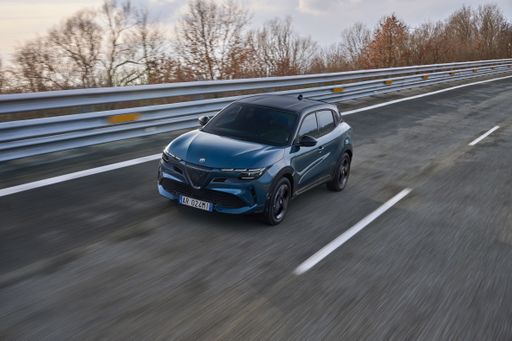 @ Alfa Romeo / Stellantis Media
@ Alfa Romeo / Stellantis Media
Alfa Romeo Junior
Costs and Consumption
View detailed analysis
Engine and Performance
View detailed analysis
Dimensions and Body
View detailed analysis
Alfa Romeo Junior
The Alfa Romeo Junior captures the essence of Italian design with its sleek lines and compact dimensions, making it an icon of elegance and performance. With a spirited driving experience and a charming retro aesthetic, it appeals to enthusiasts and casual drivers alike. This delightful car embodies the brand's rich heritage while remaining a fun and engaging option for those seeking a unique automotive experience.
details @ Alfa Romeo / Stellantis Media
@ Alfa Romeo / Stellantis Media
 @ Alfa Romeo / Stellantis Media
@ Alfa Romeo / Stellantis Media
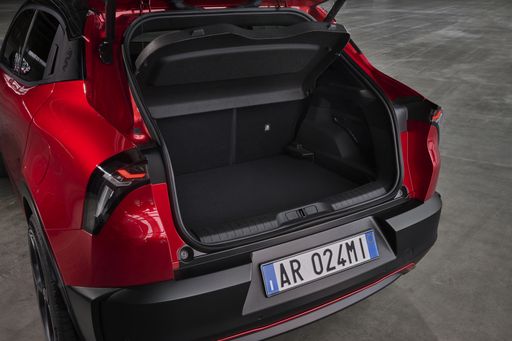 @ Alfa Romeo / Stellantis Media
@ Alfa Romeo / Stellantis Media
Mercedes EQA
The Mercedes EQA slips into the electric crossover ranks with the brand’s familiar luxury polish, offering a quiet, fuss-free drive that feels perfectly at home in the city or on a country escape. Inside it’s neatly finished and tech-forward, projecting grown-up refinement even if it plays things a bit safe for anyone chasing outright excitement.
details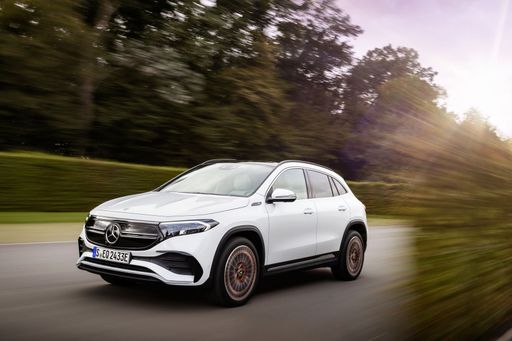 @ Mercedes-Benz Group Media
@ Mercedes-Benz Group Media
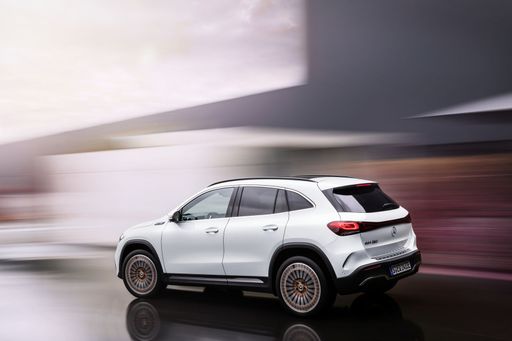 @ Mercedes-Benz Group Media
@ Mercedes-Benz Group Media
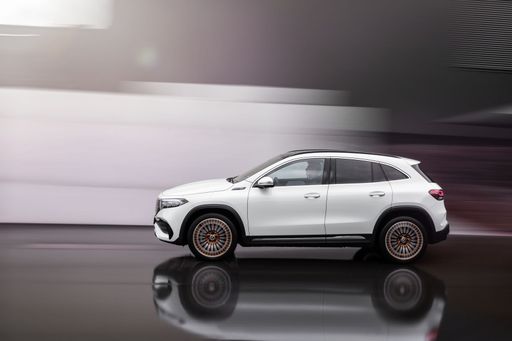 @ Mercedes-Benz Group Media
@ Mercedes-Benz Group Media
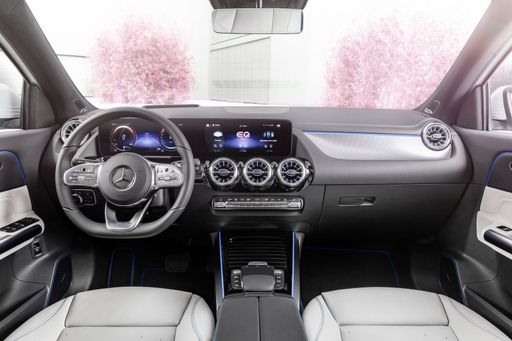 @ Mercedes-Benz Group Media
@ Mercedes-Benz Group Media
 @ Alfa Romeo / Stellantis Media
@ Alfa Romeo / Stellantis Media
|
 @ Mercedes-Benz Group Media
@ Mercedes-Benz Group Media
|
|
|
|
Costs and Consumption |
|
|---|---|
|
Price
26100 - 41600 £
|
Price
44200 - 57400 £
|
|
Consumption L/100km
4.8 - 5.4 L
|
Consumption L/100km
-
|
|
Consumption kWh/100km
15.1 - 17.5 kWh
|
Consumption kWh/100km
14.4 - 16.9 kWh
|
|
Electric Range
344 - 410 km
|
Electric Range
476 - 561 km
|
|
Battery Capacity
0.4 - 51 kWh
|
Battery Capacity
70.50 kWh
|
|
co2
0 - 119 g/km
|
co2
0 g/km
|
|
Fuel tank capacity
44 - 45 L
|
Fuel tank capacity
-
|
Dimensions and Body |
|
|---|---|
|
Body Type
SUV
|
Body Type
SUV
|
|
Seats
5
|
Seats
5
|
|
Doors
5
|
Doors
5
|
|
Curb weight
1380 - 1689 kg
|
Curb weight
2045 - 2115 kg
|
|
Trunk capacity
340 - 415 L
|
Trunk capacity
340 L
|
|
Length
4173 mm
|
Length
4463 mm
|
|
Width
1781 mm
|
Width
1834 mm
|
|
Height
1505 - 1538 mm
|
Height
1608 - 1613 mm
|
|
Max trunk capacity
1205 - 1280 L
|
Max trunk capacity
1320 L
|
|
Payload
390 - 420 kg
|
Payload
425 kg
|
Engine and Performance |
|
|---|---|
|
Engine Type
Electric, Petrol MHEV
|
Engine Type
Electric
|
|
Transmission
Automatic
|
Transmission
Automatic
|
|
Transmission Detail
Reduction Gearbox, Dual-Clutch Automatic
|
Transmission Detail
Reduction Gearbox
|
|
Drive Type
Front-Wheel Drive, All-Wheel Drive
|
Drive Type
Front-Wheel Drive, All-Wheel Drive
|
|
Power HP
136 - 280 HP
|
Power HP
190 - 292 HP
|
|
Acceleration 0-100km/h
5.9 - 9.1 s
|
Acceleration 0-100km/h
6 - 8.6 s
|
|
Max Speed
150 - 206 km/h
|
Max Speed
160 km/h
|
|
Torque
230 - 345 Nm
|
Torque
385 - 520 Nm
|
|
Number of Cylinders
3
|
Number of Cylinders
-
|
|
Power kW
107 - 207 kW
|
Power kW
140 - 215 kW
|
|
Engine capacity
1199 cm3
|
Engine capacity
-
|
General |
|
|---|---|
|
Model Year
2024 - 2025
|
Model Year
2024 - 2025
|
|
CO2 Efficiency Class
A, C, D
|
CO2 Efficiency Class
A
|
|
Brand
Alfa Romeo
|
Brand
Mercedes-Benz
|
What drive types are available for the Alfa Romeo Junior?
Available configurations include Front-Wheel Drive or All-Wheel Drive.
The prices and data displayed are estimates based on German list prices and may vary by country. This information is not legally binding.
